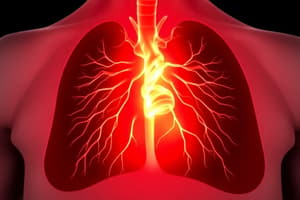Podcast
Questions and Answers
What is the primary cause of hypotension in neurogenic shock?
What is the primary cause of hypotension in neurogenic shock?
Which of the following is NOT a direct consequence of interrupted SNS signals in neurogenic shock?
Which of the following is NOT a direct consequence of interrupted SNS signals in neurogenic shock?
The term 'transient' in relation to neurogenic shock indicates that:
The term 'transient' in relation to neurogenic shock indicates that:
Which of these physiological responses is DIRECTLY impacted by the disruption of baroreceptors in neurogenic shock?
Which of these physiological responses is DIRECTLY impacted by the disruption of baroreceptors in neurogenic shock?
Signup and view all the answers
What is the primary mechanism that leads to impaired peripheral perfusion in neurogenic shock?
What is the primary mechanism that leads to impaired peripheral perfusion in neurogenic shock?
Signup and view all the answers
Study Notes
Neurogenic Shock Pathophysiology
- Damage to the nervous system disrupts signals to blood vessels, baroreceptors, and thermoregulation.
- Smooth muscle in blood vessel walls relaxes.
- Systemic and peripheral vascular resistance drastically decrease due to massive vasodilation.
- This leads to hypotension, decreased cardiac output, and bradycardia.
- Impaired peripheral perfusion is a result.
Key Characteristics of Neurogenic Shock
- Onset: Rapid, within minutes.
- Duration: Can last up to three weeks.
- Key Symptoms: Bradycardia (baroreceptors cannot regulate).
Studying That Suits You
Use AI to generate personalized quizzes and flashcards to suit your learning preferences.
Description
This quiz explores the pathophysiology and key characteristics of neurogenic shock. Understand how nervous system damage affects vascular resistance and leads to symptoms like bradycardia and hypotension. Test your knowledge on the rapid onset and implications of this condition.




